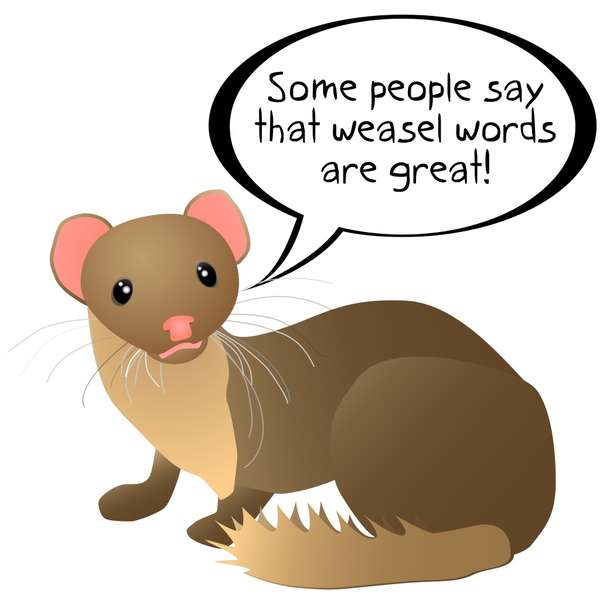Weasel Words in Tea Descriptions and Marketing
Wikipedia: Weasel_wordLast Updated: Jul. 15, 2015Weasel words are words that give a misleading impression of authority, or a false impression that something has been said, when in reality, no authority has been cited or no information communicated. These words are named as such for the way they "weasel" their way into writing, in ways that people often do not notice them and the subjectivity that they introduce.
Weasel words are sometimes used accidentally, but they can be used deliberately in marketing materials. By familiarizing yourself with weasel words, you can avoid using them in your own writing, and you can also avoid being tricked by them when you encounter them in marketing materials. Unfortunately, some tea companies use weasel words to market their product.
As a shopper, by avoiding weasel words you will protect yourself against the influence of dishonest marketing, and ultimately make better decisions when buying tea. As a tea company, by avoiding weasel words, you will cultivate a reputation for integrity, winning over tea drinkers with discerning tastes, who will be more likely to reward your integrity by writing and speaking favorably about your company.
Common weasel words in tea descriptions and marketing
Here are some of the most common words and phrases used as weasel words in tea marketing:- Rare - Tea companies often use the word rare to describe teas, because the word "rare" connotes scarcity, and people often assume (sometimes erroneously) that scarcity implies greater quality or value. But the word "rare" has no clearly agreed-upon meaning, so in the context of a tea description, it alone is meaningless. While there is nothing inherently wrong with using the word rare to apply to teas that truly are unusual or scarce, a tea company that truly sells rare tea will communicate this by identifying in more detail what makes their teas unique, such as the specific origin of single region teas, or the unique properties of a specific harvest or batch.
- Delicious or Best or You'll love this. - Different people have different tastes, and there is no way that any tea company can find a product that everyone will like. Companies making claims that their products are "best" in some universal sense are simply wrong. The best commercial descriptions of tea are those that accurately portray the qualities that each tea has, so that different people can decide for themselves whether that tea is likely to match their preferences.
- Up to 50% (or any percent) off - This phrase, common in marketing in America, is insincere and misleading. When someone reads it, the percentage discount makes an impression on their mind, but in reality, the company may have a much lower discount on most items. The statement is technically correct, but misleading. To protect yourself from these sorts of schemes, when you encounter these sorts of statements, ignore them, and avoid reading websites or buying from companies that make these sorts of claims. Companies marketing with integrity will use more descriptive sales: "20% off all items in store", or "30-50% off all items", or "80% off 2010 stock", so that you know exactly what you're getting with the sale.
- Studies show that... or Experts agree that... - These phrases are often used to introduce some sort of health claim about tea. But no study or specific expert opinion has actually been cited. The statements "Studies show that tea prevents cancer." and "Tea prevents cancer." are both unsourced health claims; although both are problematic, the first statement is more misleading because it gives a false impression of authority by its use of weasel words. Do not believe health claims unless an actual source is cited -- and cited in a way that someone could actually look it up, not just mentioned.
Writing without weasel words: show, don't tell
A good guideline for how to avoid using weasel words is that if you want to communicate a specific, potentially controversial attribute about a tea, it is better to show, not tell.Instead of using the word "best", a company could point out that the tea in question won a particular competition, or has been assigned a certain grade by a certain certifying organization. Instead of using the word "Rare", a company could explain that a tea is made only in a particular small region, and that only a particular quantity is produced each year. And rather than saying that "studies show" or "experts agree", a company can actually cite the study or quote specific experts.
Whether you work for a tea company, or are just a tea enthusiast interested in writing about tea, you can make your writing both more persuasive and more honest by refraining from the use of weasel words and instead using more descriptive language. When making claims of scientific evidence, you can cite specific sources and quote experts to back up your claims; this is particularly important when talking about the health benefits of tea. And even if you do not write about tea, you can still benefit from the same ideas of avoiding weasel words when you write on any topic.
References and Further Reading:
- Weasel Words on Wikipedia - An outstanding and thorough general reference on the topic of weasel words.
- Wikipedia Manual of Style: Words to Watch: Unsupported Attributions - An official Wikipedia guideline, based on the consensus of Wikipedia editors, this section explains how to write without weasel words.
- The Language of Advertising Claims, by Jeffrey Schrank - An outstanding essay on Weasel Words and the language in advertising, courtesy of the homepage of John B. Padgett.


